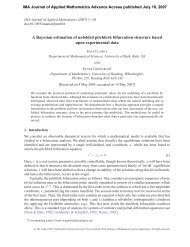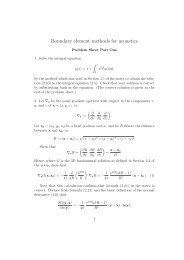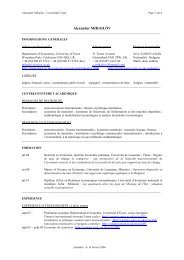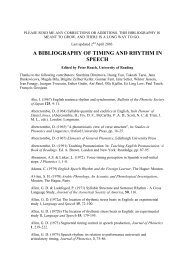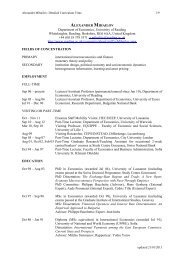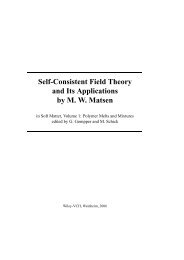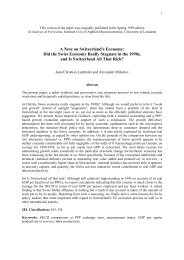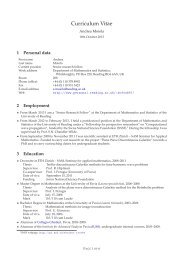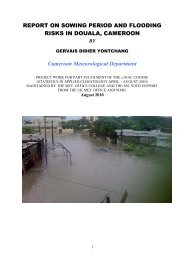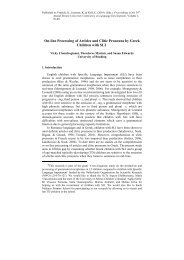Reading Working Papers in Linguistics 4 (2000) - The University of ...
Reading Working Papers in Linguistics 4 (2000) - The University of ...
Reading Working Papers in Linguistics 4 (2000) - The University of ...
You also want an ePaper? Increase the reach of your titles
YUMPU automatically turns print PDFs into web optimized ePapers that Google loves.
R. INGHAM<br />
us<strong>in</strong>g the Wilcoxon ranked sums test showed that the [+GD] group performed<br />
significantly worse on argument structure alternations than its LN matches,<br />
while the [-GD] group was statistically non-dist<strong>in</strong>ct from its LN matches.<br />
A-structure therefore seems to be a grammatical discrim<strong>in</strong>ator<br />
identify<strong>in</strong>g SLIs with a grammatical deficit, but not those without a GD. This<br />
is <strong>in</strong>terest<strong>in</strong>g because a-structure is not encoded <strong>in</strong> English by grammatical<br />
morphology. So the grammatical deficit <strong>in</strong> the GD children is seen to go<br />
beyond morphological deficit, <strong>of</strong> the k<strong>in</strong>d envisaged <strong>in</strong> e.g. Gopnik & Crago<br />
(1991).<br />
Let us now return to the issue posed by Locke <strong>of</strong> the relation between<br />
grammatical deficit and lexical deficit, which was not upheld here. <strong>The</strong><br />
problem is that 4 <strong>of</strong> the 9 GD subjects show no lexical deficit. <strong>The</strong>refore we<br />
have no reason to believe their utterance acquisition mechanism was<br />
defective. Yet they have a marked grammatical deficit. How can this be if a<br />
GD is consequent upon a deficient utterance acquisition mechanism?<br />
Conversely, five <strong>of</strong> the SLIs with NGD have a severe lexical deficit. How can<br />
this not have led to a grammatical deficit if GD is consequent upon an<br />
impaired utterance acquisition mechanism?<br />
If we <strong>in</strong>sist on l<strong>in</strong>k<strong>in</strong>g lexical deficit and GD we might have to say that<br />
the constant lag assumption made by Locke is simply too strong. <strong>The</strong> GD<br />
subjects with no LD at the po<strong>in</strong>t <strong>of</strong> test<strong>in</strong>g could have had a lexical deficit<br />
years earlier, but accelerated their lexical acquisition at a faster rate than<br />
normal so that they arrive with LN a.e. scores by the time they reached the<br />
po<strong>in</strong>t <strong>of</strong> BPVS test<strong>in</strong>g. Conversely the NGD subjects with a lexical deficit at<br />
the po<strong>in</strong>t <strong>of</strong> test<strong>in</strong>g could have had an age appropriate receptive lexicon <strong>in</strong><br />
time for Locke's structure analysis phase, phase 2, but thereafter their lexicon<br />
grew at a much slower rate than normal, so that they arrive at the po<strong>in</strong>t <strong>of</strong><br />
BPVS test<strong>in</strong>g with a major lexical deficit, which led to problems <strong>in</strong> Locke’s<br />
Phase 3.<br />
<strong>The</strong>se explanations are logically possible. But if we adopt them we<br />
have to give up the constant lag claim made by Bishop, which appears to have<br />
been well-motivated, on the basis <strong>of</strong> a large sample (over 80) languagedelayed<br />
children.<br />
We might have to do that. But for now, while there are as yet no<br />
detailed longitud<strong>in</strong>al studies <strong>of</strong> SLI children that would resolve this issue as<br />
far as I am aware, I suggest that the cross-sectional data reported here <strong>in</strong>dicate<br />
a somewhat modified version <strong>of</strong> the constant lag assumption. In some SLI<br />
children vocabulary development exhibits a persist<strong>in</strong>g lag, while <strong>in</strong> others<br />
58



